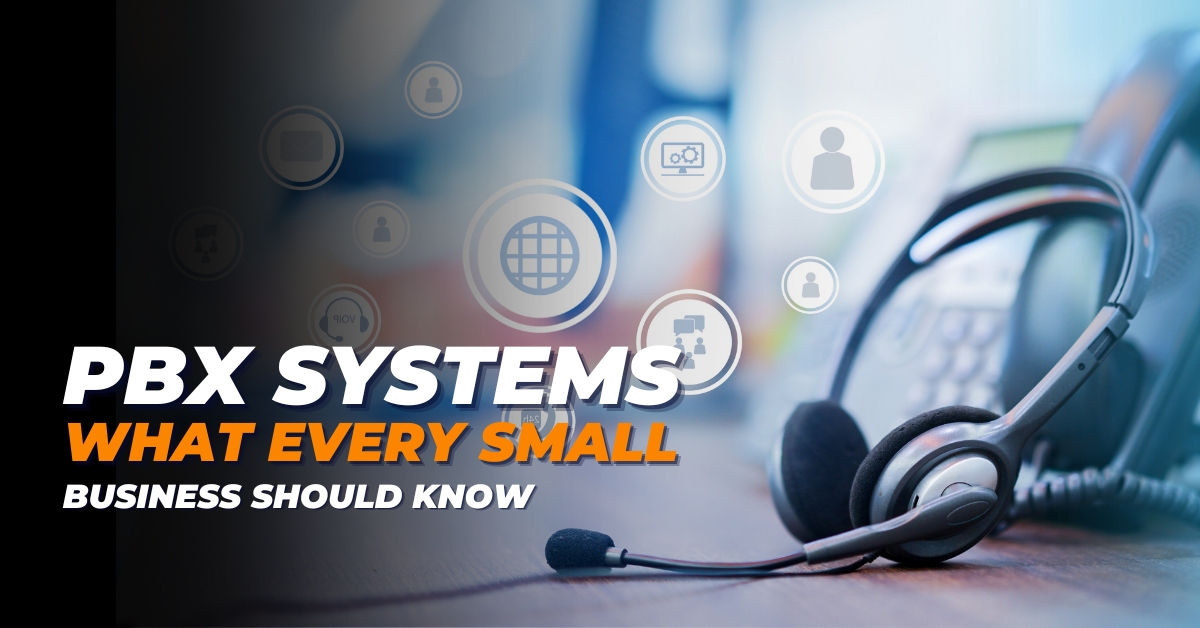Have you ever wondered how businesses handle the constant flow of calls? Enter the PBX (Private Branch Exchange) system, a technological wonder that can streamline operations and boost internal connectivity.
In simple terms, a PBX system is like a private telephone network tailored for your company. Imagine multiple phones and devices seamlessly connected to a single network. This unified communication setup simplifies connections among your team and with clients, creating a more cohesive workplace.
But it doesn’t stop there. The real charm lies in the added features PBX systems brings to the table. Voicemail, call forwarding, and conference calling are right at your fingertips, setting the stage for boosted productivity and top-notch customer service. Imagine the convenience of managing all these aspects within one integrated system.
Now, the question becomes: how do you choose the right telephone system for your unique needs? Stick around for some insightful tips in our upcoming discussion.
Definition of PBX Systems
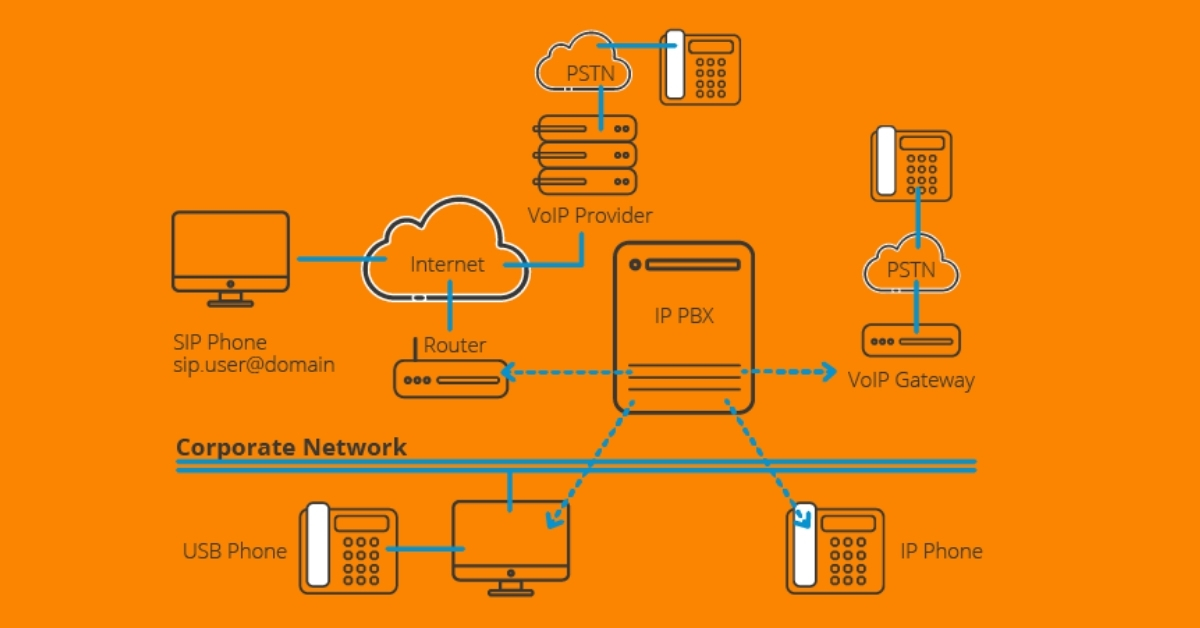
PBX systems, short for Private Branch Exchange, are like a business’s personal telephone HQ. They’re private telephone networks that companies use to handle their voice and data communications.
Business phone systems let multiple phones and devices link up to one network, making it easier for employees and customers to chat with each other.
Importance for Small Businesses
Why are PBX solutions such a big deal for small businesses? Well, they bring various benefits to the table. Cloud communication technology enhances communication capabilities, improve customer service, and smooth operations.
Thanks to features like voicemail, call forwarding and conference calling, employees can get their work done faster and collaborate better, boosting productivity and, in turn, profitability.
Moreover, telephone systems are scalable, meaning they can grow with your business. As your small business grows, you can seamlessly add new phones and extensions to your network without tearing down the whole system.
Evolution of PBX Systems

The evolution of PBX solutions showcases a fascinating journey through telecommunications. Telephone systems have come a long way, starting with basic electromechanical switches and mainly catering to larger enterprises.
Today, they stand at the forefront of innovation, embracing advanced VoIP solutions and sophisticated features.
-
Historical Overview
PBX systems have a history reaching back to the early 20th century, with the advent of the first private telephone networks. Initially employing electromechanical switches, these systems were primarily the domain of large enterprises. But as tech evolved, electronic switches took over, making these systems cheaper and more dependable.
-
Modern Features and Capabilities
Today’s PBX systems operate on VoIP (Voice over Internet Protocol) technology, enabling voice data transmission over the Internet. VoIP solutions have made them highly flexible and feature-rich compared to their predecessors.
These small business communication systems offer a cost-effective solution that allows businesses to manage communications efficiently, boost productivity, and project a polished professional image.
With telephony services like call routing, voicemail, call forwarding, conferencing, and seamless integration with other business applications such as CRM software and email platforms, small businesses can stay connected and responsive, regardless of their location.
Types of PBX Systems
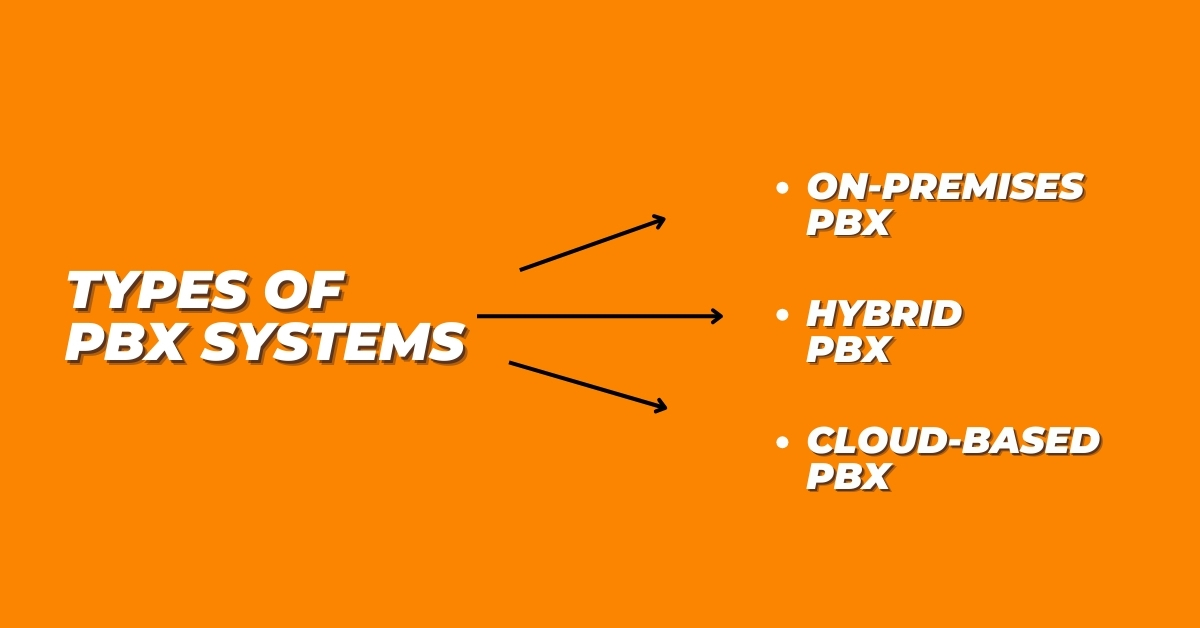
A Private Branch Exchange (PBX) system is a telecommunication solution that connects a company’s internal phone lines to the outside world, letting users make and receive calls using digital phones.
There are three main types: On-Premises PBX, Cloud-Based PBX, and Hybrid PBX.
-
On-Premises PBX
This traditional system is set up and managed on the company’s premises, suited for larger businesses with intricate communication needs. On-premises PBX systems offer several advantages, including complete control over the system and the ability to customise it to meet the business’s specific needs.
-
Cloud-Based PBX
A cloud-based PBX system, or a hosted PBX, are digital phone systems managed off-site by a third-party provider. Cloud-based PBX is gaining popularity for its scalability, flexibility, and cost-effectiveness, offering features like voicemail-to-email and call forwarding.
-
Hybrid PBX
A hybrid PBX system combines the best of both on-premises and cloud-based telephone systems. This innovative mix provides flexible and scalable telecommunication solutions. It is ideal for businesses seeking control of on-premises systems while leveraging the cost savings and flexibility of the cloud.
Benefits for Small Businesses

PBX systems are a must-have for small businesses navigating a competitive landscape, giving small businesses the edge to compete and grow in a fast-paced market. This section will outline the benefits of these systems for small companies to help you streamline your operations.
-
Cost Efficiency
Using IP PBX brings significant cost savings for small businesses. Calls over the Internet cut down on long-distance and international calling costs. Cloud-based systems add to the savings by eliminating upfront hardware expenses, with businesses only paying for the services they use.
-
Scalability
Small businesses evolve, and so do their communication needs. Business phone systems make scaling services up or down a breeze. This flexibility allows businesses to manage communication needs as they grow without splurging on unnecessary hardware or services.
-
Enhanced Communication
Office phone systems improve communication for small businesses with features like voicemail to email, call forwarding, and conference calling. These collaboration tools elevate internal and external communication, increasing productivity, superior customer service, and better teamwork.
These tools also facilitate remote office communication, which is crucial for small businesses with multiple locations or remote workers.
Key Features of PBX Systems
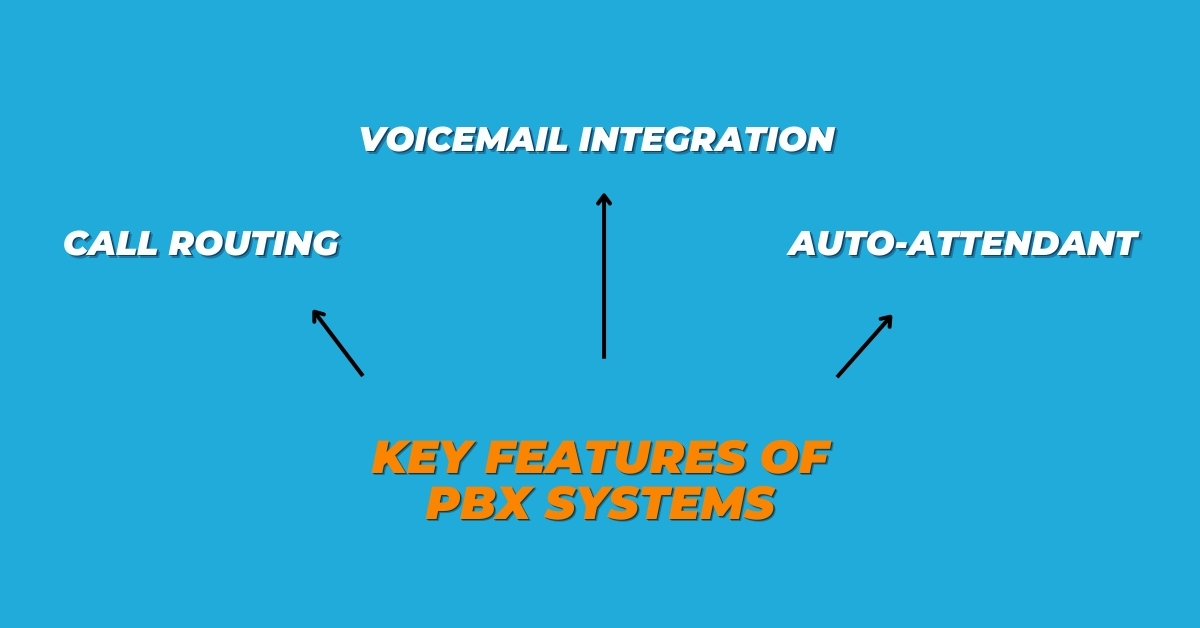
Private branch exchange systems have become necessary in today’s business communication, especially with VoIP technology driving their evolution. Let’s delve into some key aspects.
-
Call Routing
Digital phone systems excel in call routing, directing incoming calls to the correct extension or department based on the caller’s needs. It’s a handy tool, either set manually or automated with preset rules, streamlining communication and boosting customer service efficiency.
-
Voicemail Integration
Voicemail integration is another star feature. Businesses manage voicemails centrally instead of each employee having separate boxes. It ensures essential messages are noticed and offers callers the option to leave a message if the person they seek is unavailable.
-
Auto-Attendant
Auto-attendant adds a professional touch by setting up automated greetings to callers. Configurable with various options, it guides callers to specific extensions, provides business information, or facilitates order-taking.
Choosing the Right PBX System
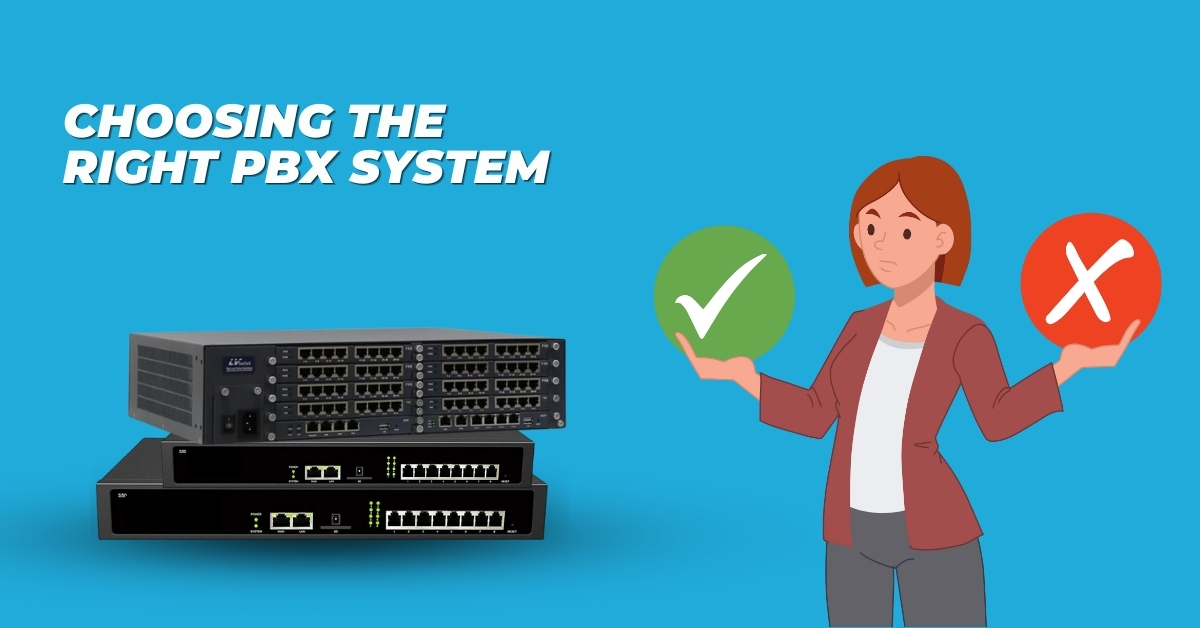
Picking the right private branch exchange system is a big deal for any business looking to fine-tune its communication setup. With a variety of options out there, it’s about finding the system that fits the unique needs and inner workings of your operation.
-
Assessing Business Needs
Before you lock in a system for your business, here are some features you need to know about:
- Take a good look at your communication needs.
- Think about your team size, office dimensions, and what kind of communication your company requires.
- Figure out if you’re gunning for fancy features like call recording, voicemail-to-email, or call forwarding.
-
Budget Considerations
Prepare for a heavy upfront investment if you’re eyeing an on-premises system. On the other hand, cloud-based systems will save you from that initial budget hit but bring in monthly fees. Make sure to do some price tag and feature comparisons from different providers before you commit.
-
Future Growth Planning
Don’t just think about now; think ahead. The system that suits your needs now might not cut it down the line. Pick something that can handle more lines and features as your business grows.
Installation and Maintenance
Knowing PBX technology’s installation and maintenance process is essential in customising your system to your company’s demands and keeping operations running smoothly.
-
On-Premises Installation
On-premises PBX installation is the go-to choice when businesses look for total control over their communication setup. This involves physically setting up hardware within the office walls, which grants direct management and customisation. It’s a prime option for tailoring the system to specific needs, including integrating internet telephony and virtual receptionist services.
-
Cloud-Based Setup
Opting for a cloud-based PBX means embracing a more flexible and scalable route. Here, the PBX infrastructure lives off-site with the service provider without needing hefty hardware, providing the same benefits as digital phone systems without the extra costs.
-
Ongoing Maintenance
Maintenance is critical, no matter the installation choice. Regular updates, security patches, and tech support keep the system reliable and secure. Businesses should consider maintenance when choosing between on-premises and cloud-based installations to guarantee uninterrupted communication services.
Security Considerations

If you’re looking to invest in a unified communication system, prioritising security helps shield sensitive business chats and data from potential threats.
-
Encryption
Robust encryption protocols within the system ensure that all communication, including internet telephony calls, stays secure and private. This blocks unauthorised access to call data, preserving the confidentiality of business conversations in a safer communication space.
-
Firewall Protection
Robust firewall integration is a must to fortify the system against outside threats. A well-configured firewall acts as a guardian, overseeing incoming and outgoing network traffic to prevent unauthorised access and potential breaches.
-
Regular Updates
Keeping the system updated with the latest security tweaks is critical to fending off evolving cyber threats, especially when using internet telephony features. Timely updates ensure a sturdy security wall for the system against potential risks.
Integration with Other Technologies
With new and innovative tools entering the arena, a private telephone system’s ability to work alongside other technologies makes space for improved communication efficiency and productivity.
-
Compatibility with CRM Systems
A telephone system that effortlessly blends in with Customer Relationship Management (CRM) systems is a game-changer. This intrigation enables automatic call logging, customer info retrieval, and call activity tracking; ensuring every communication channel is backed by comprehensive customer insights and efficient data management.
-
Connectivity with Mobile Devices
In the current mobile-centric work environment, a phone system’s linkability with mobile devices is gold. Smooth connectivity means employees can make and receive calls, access voicemails, and tap into internet telephony features via their mobiles, regardless of their location.
Common Misconceptions

In the vast landscape of telephone systems, a few things need to be clarified when choosing the right communication solution for a business. This section will debunk some common fallacies of using telephone systems in your company.
-
Addressing Myths About PBX Systems
A big misconception is that PBX solutions are solely for big enterprises. However, they come in all sizes, serving small, medium, and large businesses. Modern PBX solutions scale up or down, fitting specific company needs.
-
Clarifying Misunderstandings
Another common misunderstanding is that telephone systems like PBX need to be updated and more flexible. But modern PBX solutions are on a whole new level. They pack extensive features like internet telephony integration, mobile connectivity, and cloud-based solutions.
User-Friendly Interfaces
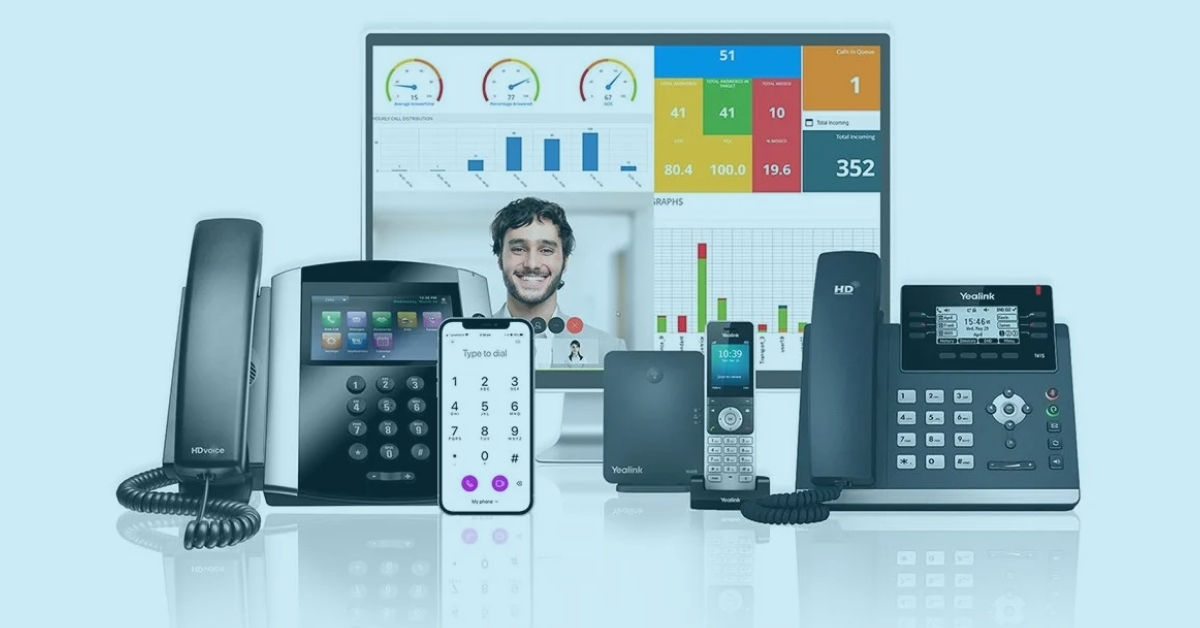
User-friendly interfaces are necessary, especially for small business employees with diverse skill sets. A well-designed interface ensures simplicity, intuitiveness, and efficiency, allowing users to navigate functions easily.
-
Importance for Small Business Employees
For small business employees, time is precious, and simplicity matters. A user-friendly interface becomes their reliable companion in daily operations. When tools and functions are simple, employees can focus on delivering top-notch service or products, which are critical in resource-tight small businesses.
-
Training and Adaptation
A user-friendly interface acts as a guiding mentor in software adaptation. They make learning new software less intimidating, cutting training time and boosting productivity.
Moreover, it supports long-term adaptation by flexibly evolving with users’ needs, which empowers the workforce to thrive in a dynamic business environment.
Bottom Line
Being savvy about communication systems is as essential as a firm handshake in the world of small businesses. Telephone systems like PBX stand at the forefront of this arena, offering a cost-effective and scalable solution to keep your team connected.
As the curtain falls on this insight into PBX systems, remember their game-changing potential. And speaking of game changers, consider checking out VoIPElements to seamlessly integrate PBX solutions with Voice over Internet Protocol (VoIP) technology. It’s where the future of business communication meets simplicity and efficiency.

